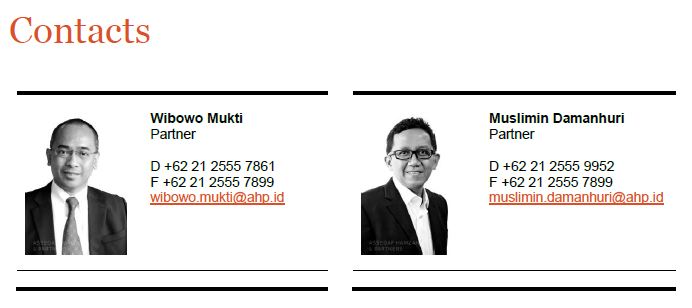Indonesia Introduces A New Tax Facility To Support the ‘Making Indonesia 4.0’ Road Map
Last year, President Joko Widodo launched the ‘Making Indonesia 4.0’ Road Map, which was an integrated roadmap designed by the Ministry of Industry to implement a number of strategies that provide a direction for the movement of Indonesia’s national industry in the future.
The roadmap requires a collaborative follow-up actions by multiple stakeholders, including government institutions, industry players, research and development centres, associations, as well as academic stakeholders.
The implementation of the road map is aimed to ensure that Indonesia is able to be one of the top-10 global economies by 2030, regain a 10% net export position, enhance the productivity-to-cost ration by two times, and build local innovation by allocating 2% of the research and development (“R&D”) spending to its GDP.
To reach the above objectives, the Indonesian government has set the 10 National Priorities consisting of:
- reforming material flows;
- redesigning industrial zones;
- accommodating sustainability standard;
- empowering small and medium-sized enterprises (SMEs);
- building nationwide digital infrastructure;
- attracting foreign direct investments;
- improving human capital quality;
- establishing an innovation ecosystem;
- providing facilities for technology investments; and
- harmonization of policy and regulations through cross-ministry collaborations.
New Tax Facility
As part of the abovementioned 10 National Priorities, the Indonesian government recently issued Government Regulation No. 45 of 2019 on Amendment to Government Regulation No. 94 of 2010 on Calculation and Settlement of Income Tax in the Current Year (“New Regulation”), which introduces new tax facilities that are commonly known as ‘super deductible tax’.
The New Regulation provides for three types of tax facility, namely:
- tax facility for a labour-intensive industry;
- tax facility for activities that foster and develop the competency of human resources; and
- tax facility for certain R&D activities in Indonesia.
An overview of each tax facility is provided below.
- Labour-intensive industryFirst, a resident corporate taxpayer making a new investment or expanding its business in a business line that is:
- in a labour-intensive industry; and
- not entitled for any tax facility under Article 31A of the Indonesian Income Tax Law or any tax facility under the Indonesian Investment Law,
may receive an income tax facility in the form of 60% net income reduction from the total investment of tangible fixed assets, including lands used for the taxpayer’s main business activities, which will be charged for a certain period.
- Activities that foster and develop the competency of human resourcesSecond, a resident corporate taxpayer that conducts job training, apprenticeship, and/or learning activities in the framework of fostering and developing certain competence to human resources may receive up to 200% tax deductible facility from the total cost incurred for such job training, apprenticeship, and/or learning activities.
Under the New Regulation, competency-based activities are defined as activities that improve the labour quality through strategic job practice, apprenticeship and/or learning programs, which are designed to achieve effectiveness and efficiency of labour and are conducted as part of an investment in the human resources sector by the taxpayer.
- Certain R&D activities in IndonesiaThird, a resident corporate taxpayer that conducts certain R&D activities in Indonesia may receive up to 300% tax deductible facility from the total cost incurred for such R&D activities in Indonesia, which would be charged for a certain period.
These R&D activities are defined as activities that results in inventions, innovations, mastery in new technologies and/or transfer of technology that enhance the competitiveness of Indonesia’s national industry.
Conclusion
The New Regulation became effective on 26 June 2019. However, in order to be operative, the New Regulation requires the issuance of a Minister of Finance regulation, which is expected to be issued immediately.
Although the implementation of the New Regulation is still unclear, so far, these tax facilities have received a positive response from industry players.

***
AHP Client Alert is a publication of Assegaf Hamzah & Partners. It brings an overview of selected Indonesian laws and regulations to the attention of clients but is not intended to be viewed or relied upon as legal advice. Clients should seek advice of qualified Indonesian legal practitioners with respect to the precise effect of the laws and regulations referred to in AHP Client Alert. Whilst care has been taken in the preparation of AHP Client Alert, no warranty is given as to the accuracy of the information it contains and no liability is accepted for any statement, opinion, error or omission.

